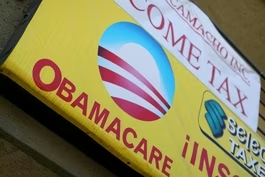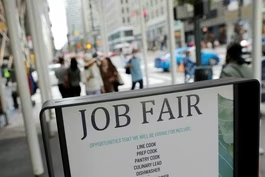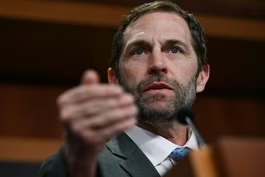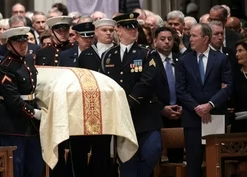
Experts offer views on coverage and cost of ACA subsidies
Clip: 11/20/2025 | 9mVideo has Closed Captions
With ACA subsidies set to expire, experts offer views on cost, coverage and alternatives
If the Affordable Care Act subsidies are allowed to expire at the end of the year, premiums would double for the average enrollee, with some paying over $1,000 more every month. The subsidies were at the heart of the recent government shutdown, but Democrats were not successful in securing a deal. William Brangam spoke with Jonathan Cohn and Brian Blaze for their views on the debate.
Problems playing video? | Closed Captioning Feedback
Problems playing video? | Closed Captioning Feedback
Major corporate funding for the PBS News Hour is provided by BDO, BNSF, Consumer Cellular, American Cruise Lines, and Raymond James. Funding for the PBS NewsHour Weekend is provided by...

Experts offer views on coverage and cost of ACA subsidies
Clip: 11/20/2025 | 9mVideo has Closed Captions
If the Affordable Care Act subsidies are allowed to expire at the end of the year, premiums would double for the average enrollee, with some paying over $1,000 more every month. The subsidies were at the heart of the recent government shutdown, but Democrats were not successful in securing a deal. William Brangam spoke with Jonathan Cohn and Brian Blaze for their views on the debate.
Problems playing video? | Closed Captioning Feedback
How to Watch PBS News Hour
PBS News Hour is available to stream on pbs.org and the free PBS App, available on iPhone, Apple TV, Android TV, Android smartphones, Amazon Fire TV, Amazon Fire Tablet, Roku, Samsung Smart TV, and Vizio.
Providing Support for PBS.org
Learn Moreabout PBS online sponsorshipWILLIAM BRANGHAM: So extending these# subsidies would cost an estimated## $350 billion over the next decade.
The president# and a number of Republicans have suggested## they would rather give that money to people# directly, rather than to insurance companies.
So, for a deeper dive on what we do now,# we get two different views.
Jonathan Cohn## is senior writer at The Bulwark# and author of "The Ten Year War:## Obamacare and the Unfinished Crusade for# Universal Coverage."
And Brian Blase is## president of Paragon Health Institute.
He served# on the National Economic Council during the first## Trump administration.
He testified in front of# Congress yesterday on rising health care costs.
Gentlemen, welcome to you both.
Jonathan Cohn, to you first.
We# just heard from several of people## who are alarmed at the prospect of what# might happen to their insurance if these## subsidies are not extended.
Given# the deadline that we are up against,## what do you think is the best course# of action?
What should we be doing now?
JONATHAN COHN, The Bulwark: Well, if you're# just talking short term, I think there's## a pretty easy answer to that.
Extend the# subsidies for one year or for two years.
There's a broader conversation to be had# about how to fix the health care system,## how to either improve or change the# Affordable Care Act.
This is a debate## we have been having for 10 years.
Democrats# put forward legislation at the beginning of## this year to talk about that.
People like# us have been talking about this for months.
The time to sort of do a bigger# conversation was six months ago,## because it takes time to work these things out.
WILLIAM BRANGHAM: Brian Blase, you testified# before Congress yesterday, arguing that the## ACA and somehow the way these subsidies are# structured is a principal driver of rising costs.
The president, as I mentioned, has suggested# funneling that money directly to individuals## instead.
What do you make of that idea?# What do you think we ought to be doing now?
BRIAN BLASE, President, Paragon Health# Institute: Yes, and thanks for having me on.
So there was bipartisan agreement at the# hearing yesterday that t.. Act has failed to make health insurance# affordable.
It's led to coverage with## significantly higher premiums,# deductibles, and narrow networks.
And one of the areas of confusion here# is that the subsidies remain in place.## For 94 percent of the enrollees, they will# maintain significant taxpayer assistance,## assistance for coverage.
That is not# going away.
What is at issue is a COVID## era policy that increased these subsidies that# go directly to health insurance companies.
And there are key structural problems# with the ACA.
And these subsidies that## go directly to health insurance companies go# to many enrollees that don't use health care## services at all.
So 35 percent of all enrollees# in 2024 didn't use their plan a single time.
Part of the problem is a surge of fraud that has# entered the program with these enhanced subsidies.## And so what is happening is, taxpayers are sending# a lot of money to insurers on behalf of people## that don't get any medical care.
And I think# we need to address the core structural problems## at the roots of the ACA that have led to a# deterioration in the quality of health insurance.
And continuing these inefficient# subsidies will mean that we don't## improve the quality of coverage in that program.
WILLIAM BRANGHAM: Jonathan Cohn,# how do you respond to that,## that something -- that the way these subsidies# are structured, they're going to people who## may not necessarily seem to need them# immediately, they're incredibly costly,## and that perpetuating them only# kicks the can down the road.
JONATHAN COHN: OK.So, well, there's a lot to# unpack there.
Let's focus on this one question of## the people who are getting subsidies and not using# them for claims, because this has come up a lot.
It is true, there's data from the government that# 30 percent or what -- I think it's actually even## a little higher now of enrollees at the ACA don't# file a claim during the year.
And this is supposed## to be evidence that you have people who are# sort of misenrolled, fraudulently enrolled.
Something to remember, I mean, the fact that you# don't use insurance in a year doesn't mean it's## wasted.
Especially younger, healthier people# are going to go and have periods when they're## not -- when I was 27, I don't think I went to# the doctor for like three years at one point.
Then the fraud issue is real.
There has been# an uptick in fraud.
But if you look at where## the fraud is -- and, actually, there's# some really good research on this from## Brian's research organization, Paragon.# What they note, it's really concentrated## in the states where they use the# federal Web site healthcare.gov.
And there were a number of changes made# to healthcare.gov that made it easier## for brokers to enroll people directly.
And# everything we -- you look at what's going on,## a lot of this is brokers behaving badly.
That's# terrible.
We should do something about that.
But you can do something about that without taking## away financial assistance from people.# And the proof is that the states that## didn't make those broker changes didn't# see nearly the kind of broker fraud.
WILLIAM BRANGHAM: Brian, back to this issue# of the deadline that we have approaching here,## there is, both from a political# perspective -- with midterms looming,## Republicans don't want to be blamed# for this sudden spike in premiums.
Do you think that what the president and# some Republicans have floated as far as,## rather than extending the subsidies,# but funneling the money to individuals,## do you think that is workable?
And do you think# it is workable in the time frame allotted?
BRIAN BLASE: So let me clarify again# that the subsidies remain in place,## and 94 percent of the enrollees# will receive subsidies still.## It means the government is paying a# substantial share of their premium.
So, for the typical enrollee next year,# the federal government is going to pay## more than 80 percent of the subsidy.# I think that there are proposals out## there that can redirect the portion of the# subsidies from the insurer to the patient.
There's actually a policy that was put in the# House-passed version of the reconciliation## bill.
It would have lowered premiums by 12# percent.
And you could -- what you could do is,## you could allow individuals to take a portion# of that subsidy that currently goes to insurers## to reduce planned deductibles and# out-of-pocket limits, and you can## give it to enrollees as an HSA contribution,# so that the enrollee controls the spending.
And, fundamentally, the way that# we reform our health care system## and make it more affordable is# to give more power to the patient## and stop sending so much federal government# directly to health insurance companies.
That## is not the way to make a system more efficient.# It's the way to keep premiums and prices rising,## because it gives insurers very bad incentives,# where their incentives are just to continue to## inflate premiums and the prices that# they pay for health care services.
WILLIAM BRANGHAM: Jonathan, last question to you.
What about that idea?
And will it# get done in time, do you think,## by the end of this year?
And what might# this do to the marketplace itself?
JONATHAN COHN: Yes, so I mean,# I think trying to put in place## something like this the next six weeks -- I# mean, we're three weeks into open enrollment,## the next plan year begins in less# than two months -- is ridiculous.
Trying to set something up like this on short# notice is not going to work.
There are lots## of reasons to be skeptical.
I mean, there# are versions of accounts that would work## perfectly fine.
And I think we're just getting# the legislative details now.
And something would## work out quite well for some people, but there's# lots of reason to think it's not a magic bullet.
People -- we have got data on this.
People# are terrible at shopping for health care,## and lots of reasons to fear that this will# shift the burden of health care spending## on to people with big medical expenses.
And# I think that gets to the basic divide here.
Is your top priority to spend less money,# believing maybe that will make the health## care system more efficient and less government# is better?
That's a respectful point of view.## Or is your top priority to make sure people get# as much help as possible because health care is## so expensive, even if that means spending more# money, even if that means bigger government?
And I think that's the choice we face here.
BRIAN BLASE: Honestly, my top# priority is a more affordable,## accountable health system that# improves Americans' health over time.
And I think Obamacare has fundamental# problems in it.
And we can't just keep## doing more of the same and sending more# money to health insurance companies.## That's just going to lead to worse# health care and worse health outcomes.
WILLIAM BRANGHAM: All right,# Brian Blase, Jonathan Cohn,## very important debate we are having here.# Thank you so much, both of you, for being here.
JONATHAN COHN: Thank you.
Americans covered through ACA face spike in premiums
Video has Closed Captions
Clip: 11/20/2025 | 4m 54s | How Americans covered through ACA exchanges are navigating the spike in premiums (4m 54s)
Chicago Fed president: Delayed report complicates rate cut
Video has Closed Captions
Clip: 11/20/2025 | 7m 52s | Delayed jobs report 'definitely complicates' rate cut decision, Chicago Fed president says (7m 52s)
Crow responds to Trump saying Democrats should be arrested
Video has Closed Captions
Clip: 11/20/2025 | 6m 37s | Trump says Democrats should be arrested for urging military to refuse unlawful orders (6m 37s)
News Wrap: Cheney funeral service held at National Cathedral
Video has Closed Captions
Clip: 11/20/2025 | 5m 29s | News Wrap: Funeral service for Dick Cheney held at Washington National Cathedral (5m 29s)
Trump considers order to override state AI regulations
Video has Closed Captions
Clip: 11/20/2025 | 4m 48s | Trump considers order to override state regulations on artificial intelligence (4m 48s)
Trump family’s cryptocurrency ties raise ethical concerns
Video has Closed Captions
Clip: 11/20/2025 | 7m 57s | Trump family’s cryptocurrency ties raise concerns as administration loosens regulations (7m 57s)
Trump pushes Ukraine peace plan with significant concessions
Video has Closed Captions
Clip: 11/20/2025 | 5m 42s | White House pushes new 28-point peace plan with concessions Ukraine previously rejected (5m 42s)
Providing Support for PBS.org
Learn Moreabout PBS online sponsorship
- News and Public Affairs

FRONTLINE is investigative journalism that questions, explains and changes our world.

- News and Public Affairs

Amanpour and Company features conversations with leaders and decision makers.
Urban Consulate Presents











Support for PBS provided by:
Major corporate funding for the PBS News Hour is provided by BDO, BNSF, Consumer Cellular, American Cruise Lines, and Raymond James. Funding for the PBS NewsHour Weekend is provided by...






